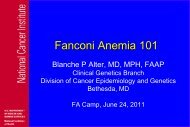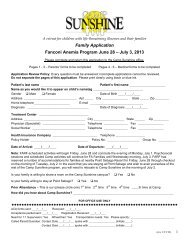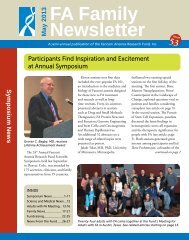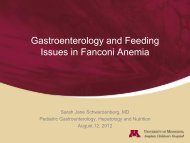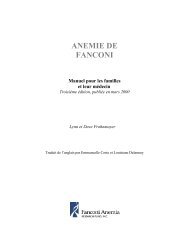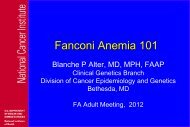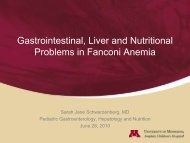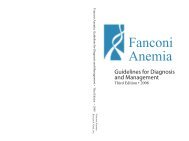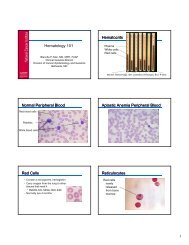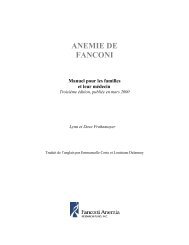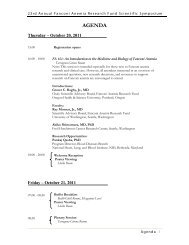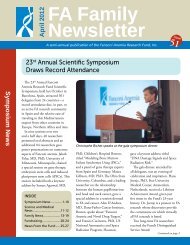FA Family Newsletter Fall 04 - Fanconi Anemia Research Fund
FA Family Newsletter Fall 04 - Fanconi Anemia Research Fund
FA Family Newsletter Fall 04 - Fanconi Anemia Research Fund
You also want an ePaper? Increase the reach of your titles
YUMPU automatically turns print PDFs into web optimized ePapers that Google loves.
MEDICAL NEWS<strong>Fanconi</strong> <strong>Anemia</strong> Cytogenetics WorkshopOn June 11 and 12, 20<strong>04</strong>, the<strong>Fund</strong> sponsored a workshop on thelaboratory diagnosis of <strong>Fanconi</strong>anemia and on bone marrow studiesof <strong>FA</strong> patients.Christopher Mathew, PhD, Guy’sHospital, London, chaired the sessionon Laboratory Diagnosis. SusanOlson, MD, Oregon Health &Science University, Arleen Auerbach,PhD, The Rockefeller University,Akiko Shimamura, MD, PhD,Dana-Farber Cancer Institute, andHans Joenje, PhD, Free University,Amsterdam presented their individualdiagnostic protocols, includingDEB, MMC, and <strong>FA</strong>NCD2-L. Theyalso addressed mosaicism, includingdistinguishing lymphocyte mosaicismfrom true stem cell hematopoieticmosaicism.The participants discussed thedetermination of <strong>FA</strong> complementationgroups and mutations, withspecific presentations by DavidWilliams, MD, Cincinnati Children’sHospital Medical Center, Hans Joenje,PhD, and Gerard Pals, PhD, FreeUniversity, and Helmut Hanenberg,MD, Heinrich Heine University.Grover Bagby, Jr., MD, OregonHealth & Science University, chairedthe session on Bone Marrow Studies.The highlights of this session werethe presentations by HeidemarieNeitzel, PhD, Charité Hospital,Berlin, and Betsy Hirsch, PhD, Universityof Minnesota School of Medicine,on the frequency and meaningof clonal chromosomal abnormalitiesin <strong>FA</strong> patients.This meeting was attended by 27diagnosticians, researchers, andphysicians from the United States,Italy, Germany, The Netherlands,England, France, Spain, Brazil, andSouth Africa. The sharing of informationby these participants and theDavid Williams, MD, Cincinnati Children’sHospital Medical Center, leads a discussion ondetermination of complementation groups.ongoing collaborations set up at themeeting will be invaluable in improvingdiagnostic and bone marrowstudies for <strong>FA</strong> patients. ◆Educational Considerations for <strong>FA</strong> PatientsAt the annual <strong>FA</strong> <strong>Family</strong> Meeting, Mary Dasovich, PhD, an educatorfrom Saint Louis University, presented information on the learning issues thatmay face some <strong>FA</strong> patients. Dasovich emphasized that it is important to notethat learning can be impacted by many factors, not just a learning disability.For example, fatigue because of the disease can cause a significant educationalperformance deficit. She noted that, because <strong>FA</strong> is a rare condition, it can bedifficult to ensure a coordinated approach to the child’s learning disability inparticular school districts. Dasovich noted the importance of identifying patternsof strengths and weaknesses and building upon strengths to compensate.Dasovich reported that her program has funds to provide educationalconsultation and support on behalf of an <strong>FA</strong> child anywhere in the UnitedStates. The consultation includes the provision of training and support toteachers and the development of professional links between the school, familyand agencies dealing with learning disability or other learning issues affectingthe school performance of a student with <strong>FA</strong>. For further information, contactDr. Dasovich through Suzanne Lauck, <strong>Family</strong> Support Coordinator, atthe <strong>FA</strong> <strong>Research</strong> <strong>Fund</strong>. ◆Dr. Dasovich discusses educational options for<strong>FA</strong> patients.2 <strong>FA</strong> <strong>Family</strong> <strong>Newsletter</strong>



